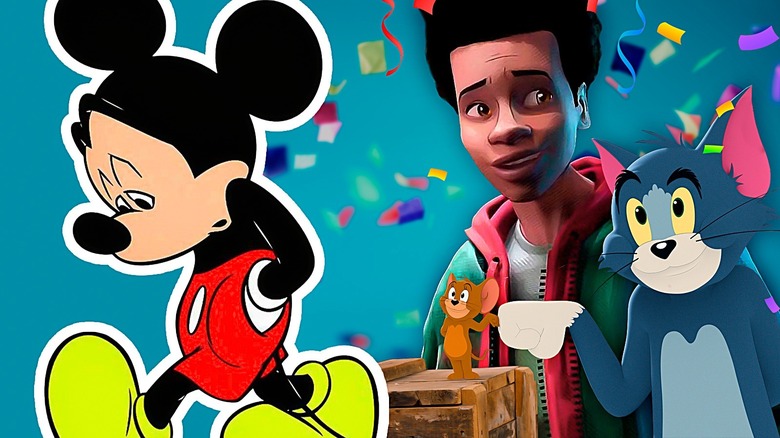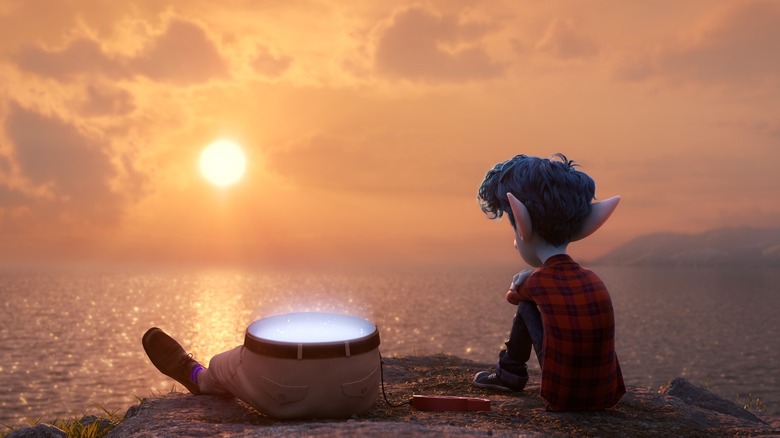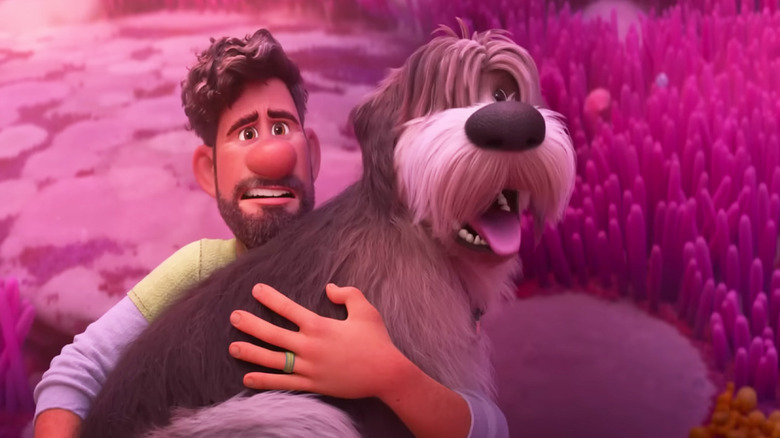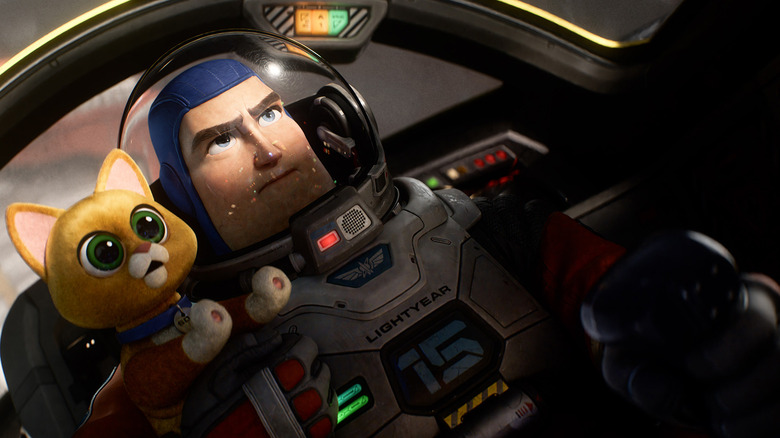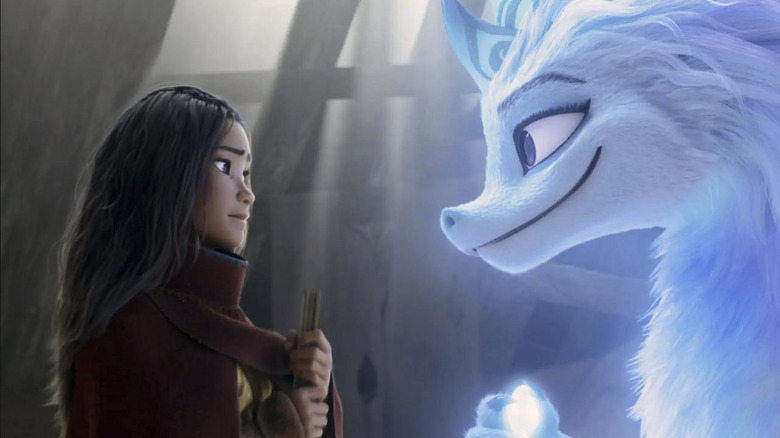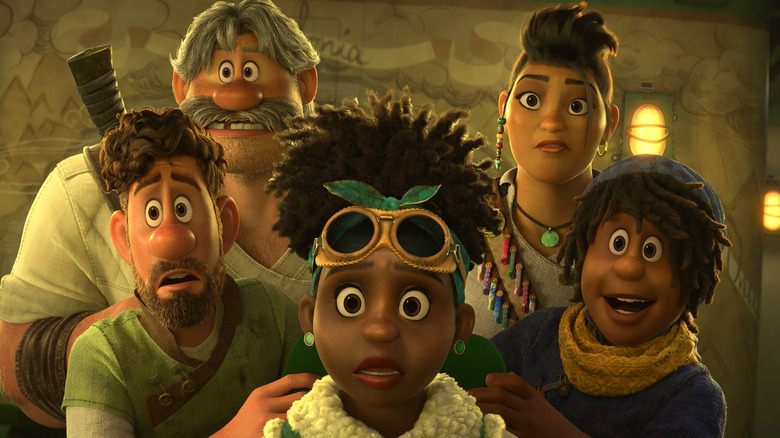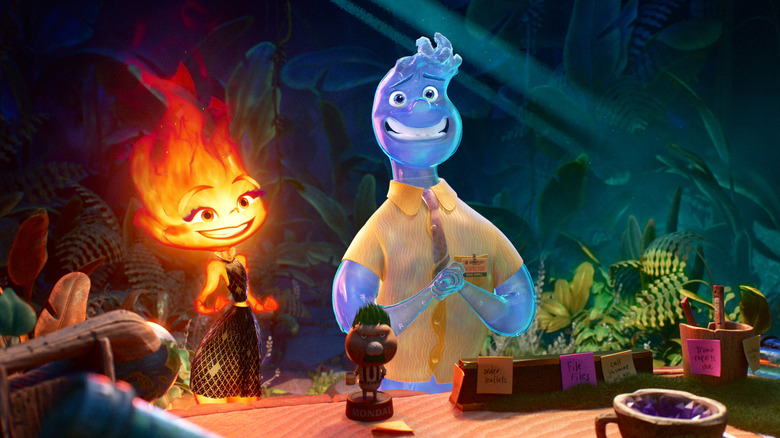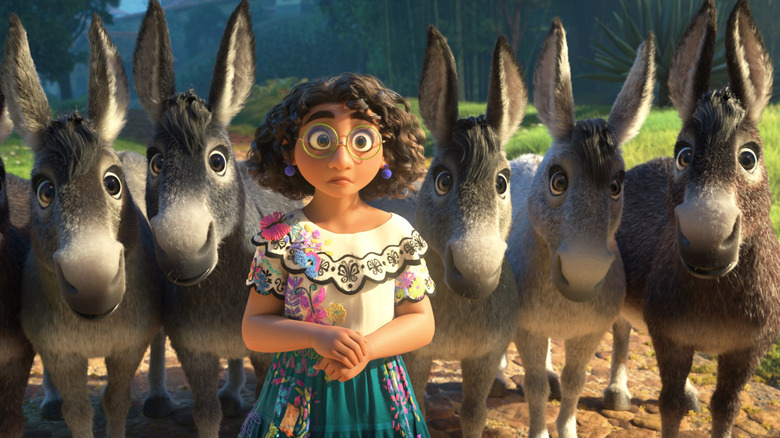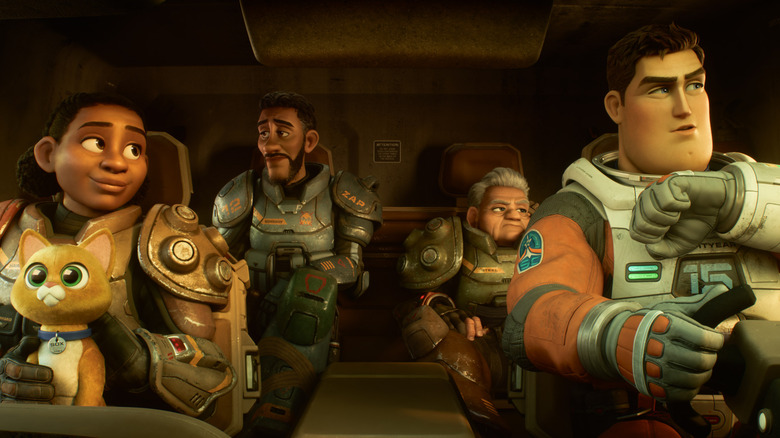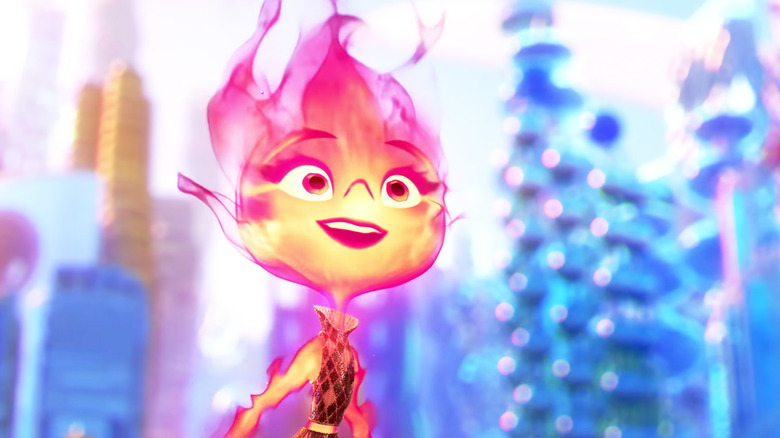Why Is Disney No Longer Ruling The World Of Feature-Length Animation?
For many, the word Disney is synonymous with the world of feature-length American animation. Of course, that's never been true: Countless other animation studios have always existed in the pop culture landscape. However, Disney's massive presence in the world of theatrical animation has, in the past, overwhelmed any other newcomers into the marketplace. But in recent years, a new status quo has emerged. Among the biggest animated movies of 2023, "The Super Mario Bros. Movie" and "Spider-Man: Across the Spider-Verse," both of which hail from non-Disney animation houses, rule over all other titles, including Pixar's "Elemental." This comes hot on the heels of 2022, when Disney had two massive animated flops ("Lightyear" and "Strange World") that lost the company untold heaps of money.
What's going on? How has Disney managed to lose its animation crown in the 2020s? The answers to that question are deeply complicated and can't just be chalked up to one factor. A multitude of elements have coalesced to inform the current beleaguered state of animation at Disney, ranging from marketing issues these projects have faced, problems rooted in the COVID-19 pandemic, and even just the matter of the overall quality of recent animated Disney titles. These problems vary wildly in their scope and source of origin, but they all reflect the troubled state the once mighty Mouse House empire is in when it comes to delivering modern animated hits.
Disney sending animated movies to Disney+
With the COVID-19 pandemic shutting down theaters in March 2020, Disney had to get creative with how and when it released its movies. While rival studios kept movies like "Top Gun: Maverick" and "Minions: The Rise of Gru" on a shelf for years until the public health crisis had somewhat abated, Disney opted to go in a different direction. Starting with "Soul," a slew of animated Disney titles either simultaneously debuted on streaming and in theaters or just exclusively went to Disney+. This practice endured all the way into 2022, which encompassed a trio of Pixar movies that were sent to the streamer for no extra charge to viewers, while Disney's "Raya and the Last Dragon" was a PVOD title on Disney+ in March 2021.
This process likely boosted the subscriber base of Disney+, but it didn't do much to help ensure that audiences still saw animated Disney titles as must-see theatrical events. On the contrary, many people at Disney are now looking back on this practice as something that hurt the box office prospects of Disney motion pictures. Pixar Chief Creative Officer Pete Docter openly admitted to The New York Times in 2023 that he chalked up the initially underwhelming box office of "Elemental" to Disney training people to think new Pixar and Disney Animation movies were best suited for streaming. No wonder Disney's animated titles are constantly getting outgrossed by features from Illumination, a label whose movies have been kept strictly theatrical-exclusive.
Struggles of launching original animated movies in sequel-dominated landscape
In the 2010s, Disney's animation divisions were enamored with sequels and prequels. Pixar Animation Studios especially got immersed in the realm of franchises thanks to titles like "Finding Dory," "Incredibles 2," and "Toy Story 4." After all these projects, Pixar and Disney Animation Studios opted to reorient their creative efforts at the start of the 2020s back toward original movies like "Soul" and "Encanto." Unfortunately, such titles were now competing with a theatrical animated cinema landscape stuffed full of sequels and adaptations of famous pre-existing properties. The biggest animated titles of 2023, for instance, have been "The Super Mario Bros. Movie" and "Spider-Man: Across the Spider-Verse."
Granted, Pixar's "Lightyear" also flopped in this sequel-saturated marketplace, so it's not like Disney exclusively committing to animated franchise fare would solve all its box office woes. However, the studio's problems with animated cinema have been compounded by its non-sequels struggling to stand out against established sagas. It's difficult to get the attention of moviegoers with an original piece of storytelling when Illumination has long-established characters like the Minions or Mario at its disposal. Recent developments like Paramount Animation no longer sending original titles to theaters means that all this franchise-centric competition won't be going away anytime soon. Original Disney titles like "Encanto" and "Strange World" are likely a harbinger of the Mouse House further struggling to withstand all that franchise competition.
The lack of urgent marketing
Before the release of the November 2022 film "Strange World," Disney geeks around the internet began to question why this new motion picture was getting the short shrift in its marketing campaign, as a lack of posters or other major promotional pushes preceded its theatrical debut. That's a sharp contrast to the omnipresent marketing pushes that heralded the imminent arrival of titles like "Zootopia" or "Frozen" in the past. Typically, Disney's been unsurpassed in spreading the word far and wide about the release of its newest animated features. However, in recent years, those kinds of significant marketing pushes have become rarer to see.
Without this kind of promotional push, Disney's animated movies have struggled to stand out in a marketplace largely defined by blockbusters that are rampantly promoted to the ends of the Earth. It's impossible for these productions to make an impression on potential audiences — who have so many different viewing options to choose from, after all — with their current level of marketing against Marvel films or other massive modern blockbusters. Even compared to other animated projects like "The Super Mario Bros. Movie" and "Sing 2" which have been launched to theaters alongside all kinds of creative marketing gimmicks, the most recent animated Disney titles have received lackluster marketing pushes. "Strange World" and its lack of discernible promotional materials is a microcosm of a key problem plaguing Disney's animation studios.
The mixed responses to modern animated Disney titles
One unavoidable problem with many modern animated Disney titles is that their critical reception has just not been as good as classic titles from Pixar and Disney Animation. While acclaimed projects like "Encanto" and "Turning Red" are still emerging from these outfits, many of their productions in the 2020s received more muted responses. Titles like "Onward," "Lightyear," "Strange World," and "Elemental" all received mixed reviews from critics, with many of the most negative responses unfavorably comparing these movies to classic features like "The Incredibles" and "Moana." It doesn't help that titles like "Onward" and "Elemental" were original films that needed positive responses to help put them on people's radar.
Additionally, rival animated films like "Teenage Mutant Ninja Turtles: Mutant Mayhem" and "Spider-Man: Across the Spider-Verse" have received significantly better reviews than many of Disney's modern animated movies. Even "Minions: The Rise of Gru" secured a similar Metacritic aggregative score as Pixar's 2023 feature "Elemental." It's not enough that other studios are delivering franchise titles overshadowing Disney's original animated titles. Competing outfits are also making movies that can now stand toe-to-toe with Disney's animated films in terms of general critical reception. This downward trend in critical reception has undoubtedly played a part in Disney's animated films no longer being seen as the cream of the crop among American animated features.
Disney's troubled relationship with theaters
If you were a movie theater open in March 2021, you were desperate for new movies to fill your auditoriums with. Thanks to the COVID-19 pandemic raging on and movie studios delaying so many of their titles, the theatrical cinema landscape back then was as sparse as can be. The arrival of a new Walt Disney Animation Studios title like "Raya and the Last Dragon" should have seemed like an answer to people's prayers in these circumstances. However, this situation turned out to be considerably more complicated than that. Major theater chain Cinemark refused to screen "Raya and the Last Dragon" at its locations when the film first opened due to the corporation failing to come to an agreement with Disney regarding its decision to give it a simultaneous PVOD release.
This squabble eventually got resolved, with Cinemark screening "Raya and the Last Dragon" starting in late April 2021, and the theater chain hasn't expressed any issues with the screening terms of subsequent animated Disney movies. However, this kerfuffle reflected the strained relationship Disney had with exhibitors at this point in time, while the initial lack of Cinemark screens severely limited the potential audience for "Raya and the Last Dragon." Given how rival animation studios like Illumination and Sony Pictures Animation haven't had a trace of these problems with movie theater chains, Disney's "Raya and the Last Dragon" Cinemark controversy is another issue specifically plaguing this particular production company.
Disney's embraced more action-oriented animated films
In 2022, Disney's animated family films were dominated by action-oriented sci-fi yarns. Disney's animated movies have often featured punching or aliens, but combining the two has always been a difficult challenge for any animation studio. Projects like "Titan A.E.," "Battle for Terra," or Disney's own "Atlantis: The Lost Empire" and "Treasure Planet" are all infamous box office bombs. Family audiences get a little squeamish whenever new animated titles look more like "Star Trek" than "Despicable Me." Yet Disney opted to fixate its entire theatrical animated cinema slate in 2022 on "Lightyear" and "Strange World," a pair of titles that were very much in the action sci-fi mold.
Inevitably, both titles not only flopped but also became two of the biggest money losers of the entire year. This development wasn't too surprising given the box office track record of this genre with family audiences in the past, but it still came at a terrible time for Disney. Just as the studio was trying to regain its footing with theatrical animation, it embraced a style of storytelling that's often been box office poison. Animated musicals and pathos-heavy stories have been Disney's bread and butter in the past. Sci-fi action films, not so much. Leaning so heavily on the latter genre helped ensure Disney lost its status as the ruler of animated family cinema at the box office.
Disney's movies are out of step with modern sensibilities
One of the great joys of Disney's recent animated releases was Domee Shi's feature-length directorial debut "Turning Red." A feature set in Toronto at the dawn of the 21st century, "Turning Red" has a zippy sense of humor to it and a heavily stylized animation style that immediately sets it apart from other Pixar Animation Studios features. These and other qualities (such as its frank approach to discussing puberty) made "Turning Red" feel like something that was made for the sensibilities of modern audiences. Unfortunately, Disney's animated films have often struggled to reach those kinds of creative highs beyond "Turning Red," with many of the company's titles seeming out of tune with what today's young audiences are interested in watching.
Something like "Onward," for instance, featured a vision of "modern" fantasy life too derivative of other animated family movies. "Lightyear" was enamored with creating a lengthy homage meant to placate '90s kids, while "Strange World's" retro-adventure aesthetic was too old-fashioned for its own good. Compare that to competing animated films like "Spider-Man: Across the Spider-Verse" or "The Mitchells vs. The Machines," which feature decidedly modern stories told with visuals that feel fresh and exciting. Other major animated movies have been able to keep up with the times, but save for occasional gems like "Turning Red," Disney's recent animated output has felt retro in all the wrong ways.
Poor release date choices
In March 2021, Disney opted to drop "Raya and the Last Dragon" just one week after fellow family movie "Tom & Jerry," which had a massive recognizable brand name at its disposal. A year later, "Lightyear" opened two weeks before "Minions: The Rise of Gru," while in June 2023, "Elemental" premiered only two weeks after "Spider-Man: Across the Spider-Verse." The mid-June slot is a release date that's served Disney's animated films well in the past. However, for "Lightyear" and "Elemental," that date just put these projects in the crosshairs of massive, animated sequel blockbusters. That choice is emblematic of the poor release date choices plaguing so many of Disney's modern animated movies.
Disney's release date choices, intentionally or not, communicate the idea that the studio thinks its animated projects can steamroll over any competition in the vicinity. Instead, adhering to the release dates has ensured that an assortment of animated Disney projects have been overshadowed by competing family features. Even "Encanto," which went out in the reliable Thanksgiving slot for Disney Animation titles, had its theatrical run cut short once "Sing 2" entered theaters a month later. Staunchly adhering to release dates that have worked in the past hasn't served Disney Animation titles in the here and now very well at all. If Disney wants to get its animated titles back on track, taking riskier chances on unexpected release dates would be a great idea.
The lack of all-ages appeal in recent Disney titles
In the immediate aftermath of the disappointing opening weekend box office performance of "Lightyear," an interesting statistic emerged regarding just who went to see the movie in its initial days of release. It turned out that a staggeringly high level of adult moviegoers hit the cinemas during its opening weekend, which suggested that "Lightyear" only really appealed to people who'd grown up with the original "Toy Story." There was also a strange dearth of younger moviegoers who turned out for "Strange World" on its opening weekend over Thanksgiving 2022. In this particular year, Disney's animated fare failed to appeal to audiences of all ages.
Without that kind of universal appeal, it's impossible for these titles to justify their $200+ million budgets. You don't get a box office hit as big as "Frozen" or "Zootopia" by only appealing to either youngsters or grown-ups — you have to make animated projects that can be exciting for everyone. That sort of appeal has been easy for past Disney animated projects to achieve, with many classic titles from the company such as "The Lion King" and "Inside Out" becoming must-see events for all kinds of moviegoers. What was once a given for animated Disney blockbusters has now proven elusive for recent projects like "Lightyear." Without that kind of multi-generational pull, it's no wonder Disney's animated titles have begun sinking to new lows at the box office.
Disney could only rule animated family cinema for so long
Disney's iron grip on animated family cinema is legendary, but it's also not something that has existed forever. Throughout history, Disney's animated features have gone through various creative and financial slumps. The years immediately following Walt Disney's demise, for instance, saw Walt Disney Animation Studios nearly crumbling as its artists tried to figure out what kind of features the outfit should produce. Meanwhile, in the early 2000s, that same company was faced with overwhelming competition from new entries into the animation cinema game as well as the increased presence of computer animation.
If historical precedence is any indication, Disney's dominance comes in fits and waves. It was especially inevitable that this company's animated efforts would begin to wobble, considering just how lucrative the Mouse House was during the 2010s. Throughout the 2010s, Disney hit $1.5+ billion annually each year with ease, a feat accomplished by the box office hauls of animated titles like "Frozen II" and "Finding Dory." After so many consistent box office hits, the law of averages suggested that the studio would find itself in a slump eventually. But if there's anything reassuring about this situation for Disney geeks and artists alike, it's that, just as the good times don't stretch on eternal, the bad times don't either. Disney's animated films escaped previous eras of creative stagnation, and it's likely the Mouse House will also emerge from its current box office woes.
